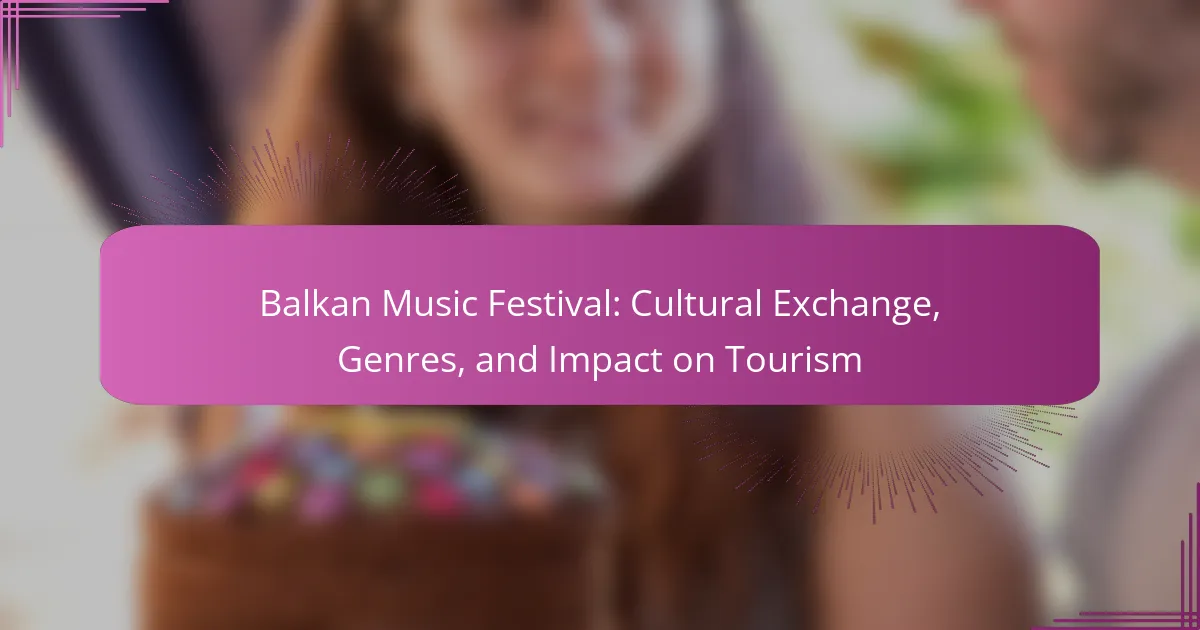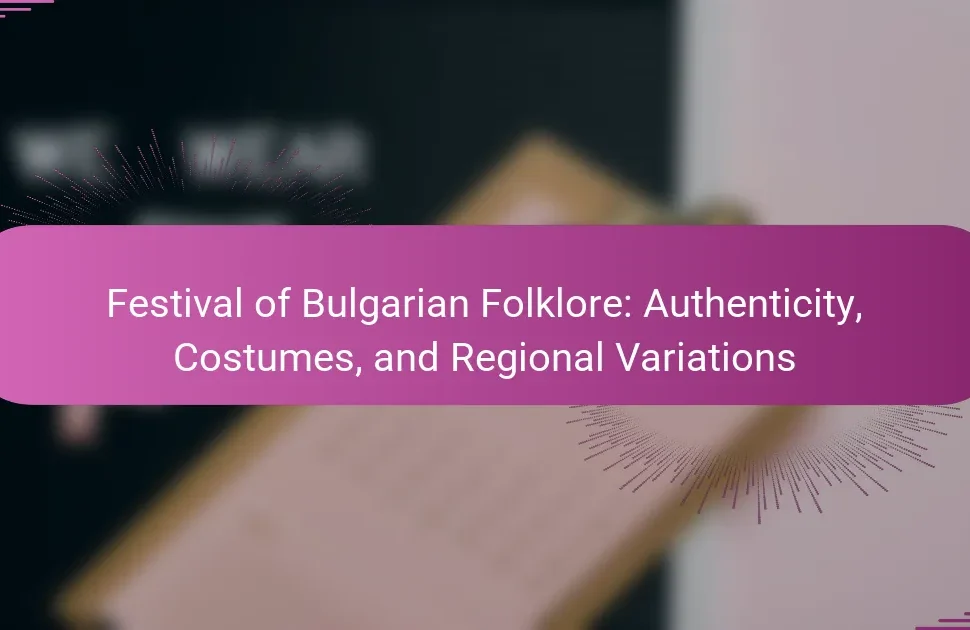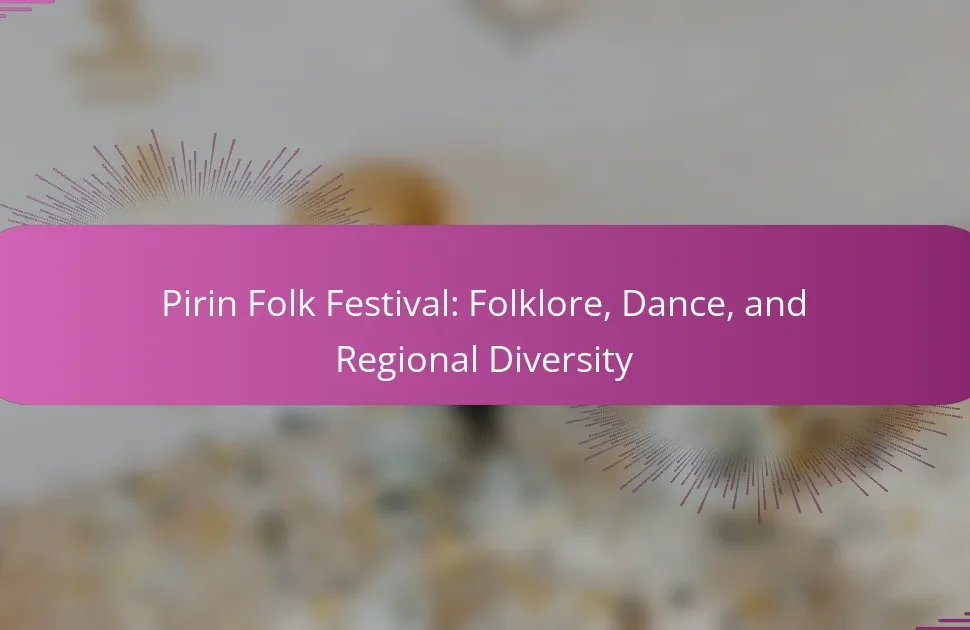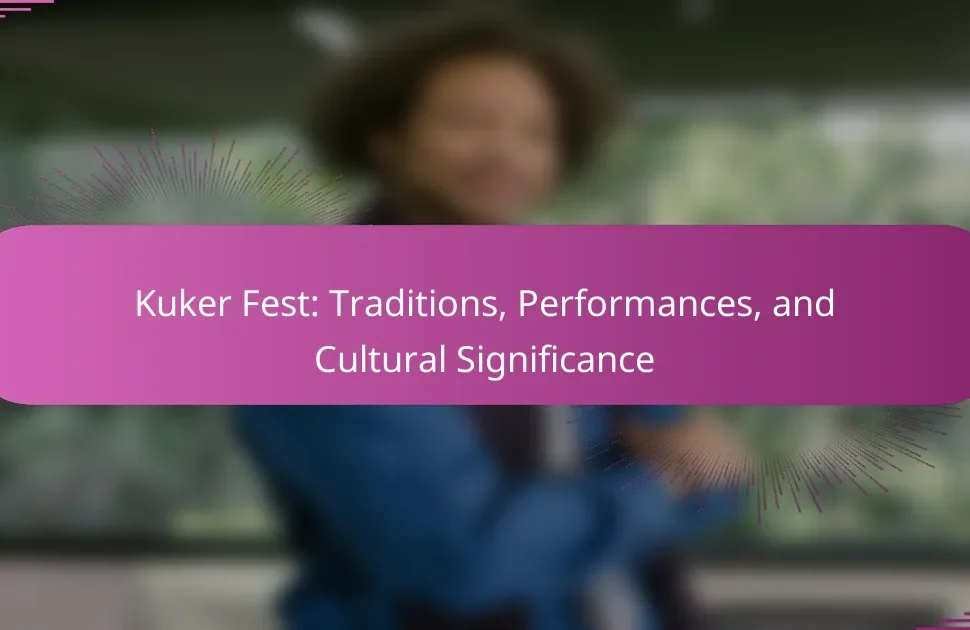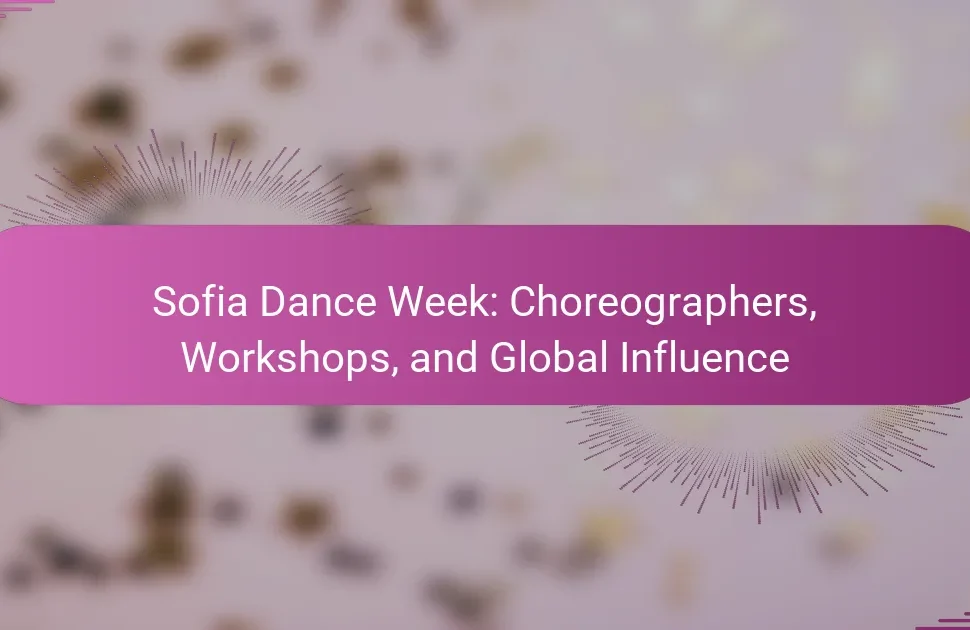The Balkan Music Festival serves as a vital platform for cultural exchange, showcasing diverse genres and boosting local tourism. It highlights traditional and contemporary music, attracting international visitors and enhancing regional economic growth. The festival also supports local artists while addressing challenges related to funding and audience engagement. Strategies for future events focus on sustainability and cultural inclusivity to maintain its impact.

What role does the Balkan Music Festival play in cultural exchange?
The Balkan Music Festival significantly enhances cultural exchange by showcasing diverse musical genres. It fosters connections among artists and audiences, promoting understanding and appreciation of Balkan heritage. The festival attracts international tourists, boosting local economies and cultural tourism. By highlighting unique musical traditions, it preserves cultural identities while encouraging collaboration across borders.
How does the festival promote regional music diversity?
The Balkan Music Festival promotes regional music diversity by showcasing various genres and facilitating cultural exchange. It features artists from different Balkan countries, allowing them to present their unique musical traditions. This exposure fosters appreciation for diverse styles, such as folk, pop, and classical music. As a result, the festival enhances tourism by attracting visitors interested in experiencing this rich cultural tapestry. Moreover, collaborations among artists create new fusion genres, further enriching the regional music scene.
Which countries participate in the festival and why?
Countries participating in the Balkan Music Festival include Albania, Bosnia and Herzegovina, Bulgaria, Croatia, Montenegro, North Macedonia, Romania, Serbia, and Slovenia. These nations engage to promote cultural exchange, showcase diverse music genres, and boost tourism. Each country brings unique musical traditions, enhancing the festival’s appeal and fostering regional collaboration. The event significantly impacts local economies by attracting tourists and promoting cultural heritage.
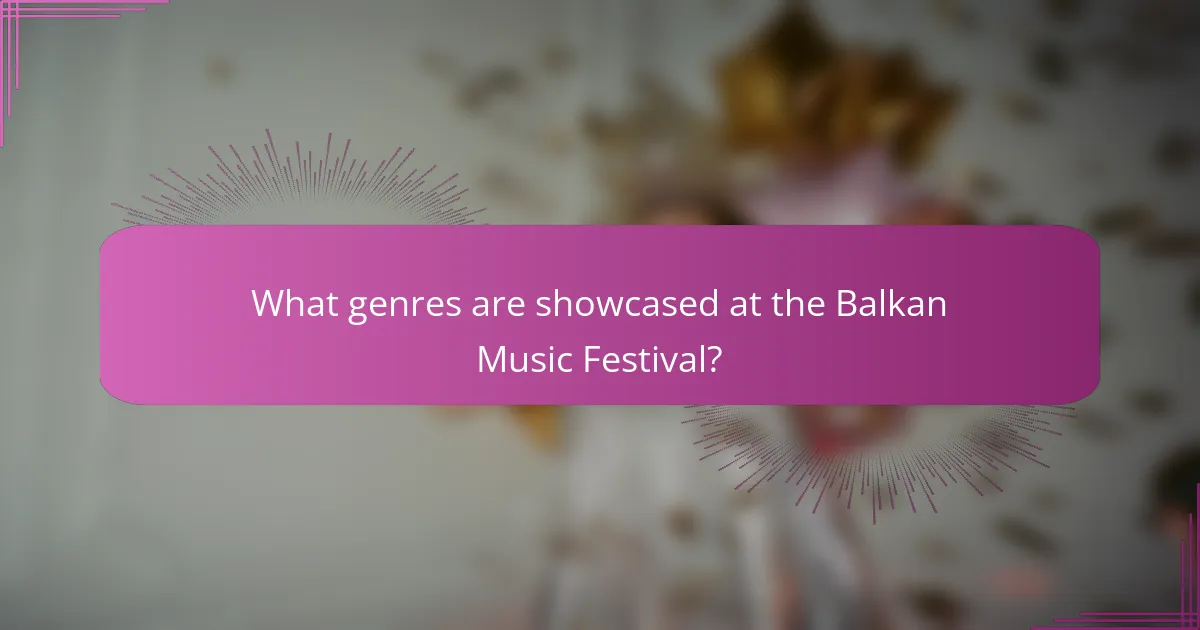
What genres are showcased at the Balkan Music Festival?
The Balkan Music Festival showcases a diverse range of genres, including folk, traditional, and contemporary music. These genres highlight the region’s rich cultural heritage and promote cultural exchange. Notable genres featured often include Balkan brass, Roma music, and various regional folk styles. This variety attracts tourists and enhances the festival’s impact on local economies.
How does traditional Balkan music influence contemporary genres?
Traditional Balkan music significantly influences contemporary genres by introducing unique rhythms, melodies, and instruments. This cultural exchange enriches modern music styles, fostering innovation and diversity. For instance, Balkan brass bands have inspired genres like gypsy punk and world music, enhancing their global appeal. The intricate time signatures and improvisational elements of Balkan music create a distinct sound that resonates with contemporary audiences, driving the popularity of festivals celebrating this heritage. Additionally, the fusion of traditional and modern elements attracts tourists, boosting local economies and promoting cultural awareness.
Which unique musical styles can be found at the festival?
The Balkan Music Festival showcases unique musical styles such as Balkan brass, Romani music, and traditional folk. These genres highlight the region’s cultural diversity and foster cross-cultural connections. Additionally, contemporary fusion styles blend traditional elements with modern influences, enhancing the festival’s appeal. The festival also features rare performances of regional sub-genres, enriching the overall experience.
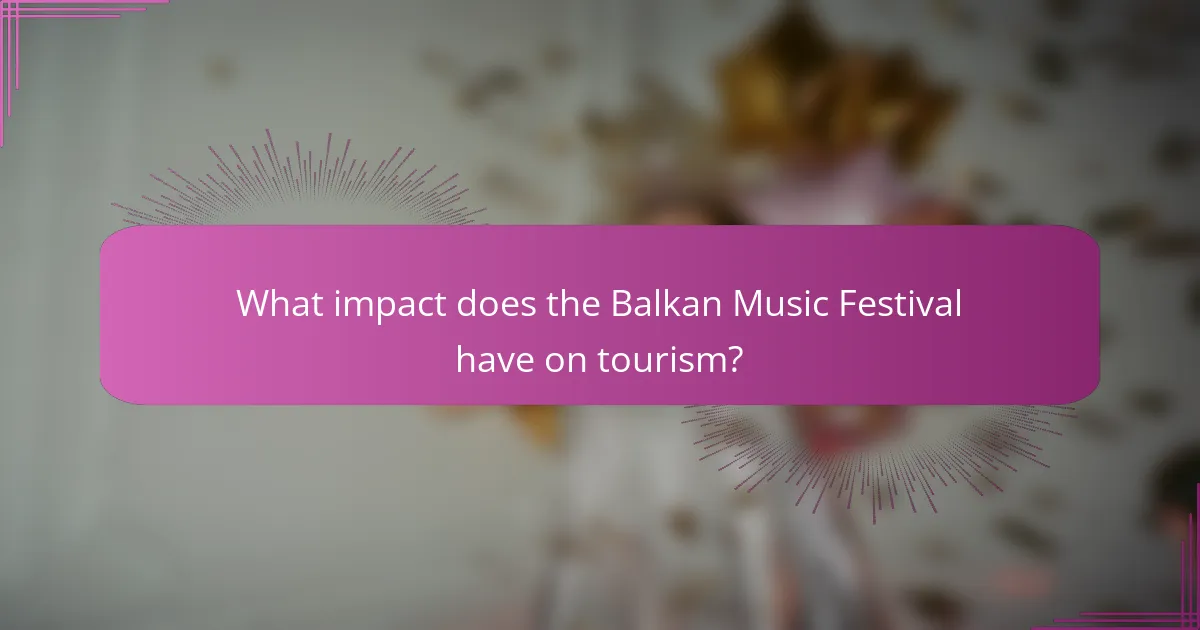
What impact does the Balkan Music Festival have on tourism?
The Balkan Music Festival significantly boosts tourism by attracting visitors eager to experience diverse cultural expressions. This festival showcases various Balkan music genres, enhancing the region’s visibility and appeal. Increased attendance leads to higher spending in local businesses, including hotels, restaurants, and shops. As a result, the festival fosters cultural exchange and supports the local economy. Additionally, it promotes regional identity and heritage, encouraging repeat visits and strengthening tourism infrastructure.
How do local economies benefit from the festival?
Local economies benefit from the Balkan Music Festival through increased tourism, local business support, and cultural promotion. The festival attracts visitors, boosting spending in hotels, restaurants, and shops. This economic influx can lead to job creation and enhanced community engagement. Additionally, the festival showcases local culture, fostering pride and encouraging preservation of traditions.
What are the visitor demographics at the festival?
The Balkan Music Festival attracts a diverse audience, primarily aged 18 to 35. Approximately 60% of visitors come from neighboring Balkan countries, while 30% are international tourists. The festival promotes cultural exchange, drawing attendees interested in music genres like folk, pop, and electronic. This demographic engagement significantly impacts local tourism, enhancing the region’s cultural appeal.
Which marketing strategies attract international tourists?
The Balkan Music Festival attracts international tourists through cultural exchange, diverse genres, and immersive experiences. Strategies include promoting local music heritage, leveraging social media for global reach, and collaborating with travel agencies. Highlighting unique attributes like traditional performances fosters authentic connections. As a result, these strategies enhance tourism and create lasting cultural impacts.

How does the Balkan Music Festival support local artists?
The Balkan Music Festival supports local artists by providing a platform for exposure and collaboration. It showcases diverse genres, promoting cultural exchange and enhancing visibility for regional talent. The festival attracts tourists, boosting the local economy and creating opportunities for artists to connect with international audiences. This unique blend of cultural celebration and economic impact fosters a vibrant artistic community in the region.
What opportunities does the festival provide for emerging musicians?
The Balkan Music Festival offers emerging musicians exposure, networking, and performance opportunities. Artists can showcase their talents to diverse audiences, fostering collaborations with established musicians. The festival also provides workshops, enhancing skills and knowledge in various genres. Additionally, participation can lead to increased visibility and potential bookings in the tourism sector, benefiting both artists and the local economy.
How are collaborations between artists facilitated?
Collaborations between artists are facilitated through networking events, joint performances, and cultural festivals. The Balkan Music Festival exemplifies this by bringing diverse genres together, enhancing cultural exchange. Artists share their unique styles, fostering creativity and innovation. This collaboration not only enriches the music scene but also boosts tourism, as attendees seek authentic cultural experiences.

What challenges does the festival face in 2025?
The Balkan Music Festival faces challenges in 2025 related to funding, audience engagement, and cultural representation. Funding issues may arise from economic fluctuations, impacting sponsorship and ticket sales. Audience engagement could decline due to competing events or changing entertainment preferences. Cultural representation is crucial, as the festival must authentically showcase diverse Balkan genres while ensuring inclusivity. Addressing these challenges is essential for maintaining the festival’s impact on tourism and cultural exchange.
How does the festival adapt to changing cultural trends?
The Balkan Music Festival adapts to changing cultural trends by incorporating diverse genres and promoting cultural exchange. This flexibility attracts a broader audience and enhances its relevance. For example, the festival has expanded its lineup to include contemporary Balkan artists and international acts, reflecting evolving musical tastes. Additionally, workshops and discussions on cultural heritage foster engagement and awareness, ensuring the festival remains a dynamic platform for cultural dialogue. As a result, the festival significantly impacts local tourism, drawing visitors eager to experience its unique blend of tradition and modernity.
Which logistical issues impact festival organization?
Logistical issues that impact festival organization include transportation, venue selection, staffing, and resource allocation. Effective management of these factors is crucial for a successful Balkan Music Festival.
Transportation challenges arise from coordinating artist arrivals, equipment delivery, and audience access. Venue selection involves ensuring adequate space, facilities, and compliance with local regulations. Staffing issues include recruiting qualified personnel and managing volunteer schedules. Resource allocation requires budgeting for sound systems, stages, and security, impacting overall festival quality and attendee experience.

What best practices can be implemented for future festivals?
To enhance future Balkan Music Festivals, implement strategies focused on sustainability, cultural inclusivity, and audience engagement. Prioritize eco-friendly practices, such as waste reduction and local sourcing. Foster diverse cultural representation through varied genres and artists. Utilize digital platforms for broader reach and engagement, creating interactive experiences that resonate with attendees.
How can organizers enhance attendee experience?
Organizers can enhance attendee experience at the Balkan Music Festival by focusing on cultural immersion, diverse genres, and interactive activities. Engaging local artists fosters authentic cultural exchange, enriching the festival atmosphere. Providing workshops on Balkan music traditions allows attendees to participate actively, deepening their understanding. Additionally, incorporating food stalls featuring regional cuisine enhances sensory experiences. Efficient logistics and clear communication further improve overall satisfaction, making attendees feel valued and connected to the festival’s cultural significance.
What strategies can improve artist participation?
Engaging artists in the Balkan Music Festival can be enhanced through strategic outreach, collaborative opportunities, and cultural integration. Promoting diverse genres fosters participation and enriches the festival’s cultural tapestry.
1. Establish partnerships with local and international artists to create collaborative performances.
2. Provide platforms for emerging artists to showcase their talents, increasing visibility and participation.
3. Implement workshops and masterclasses that encourage skill sharing among artists and attendees.
4. Utilize social media campaigns to reach a broader audience and attract artists from various backgrounds.
